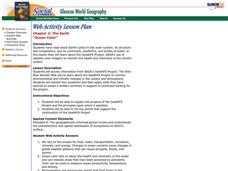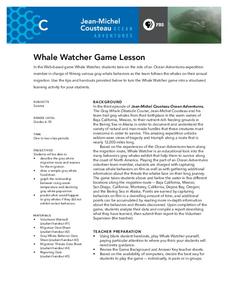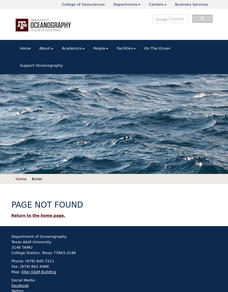Curated OER
Let's Go To Mexico
Students are able to use the Internet to conduct research. They research Mexican culture and traditions. Students compare and contrast Mexican and U.S. food and clothing. They convert United States currency to Mexican pesos. Students...
Curated OER
Field Trip - Marine Science Institute
Students discover the ocean life of the San Francisco Bay. In this ocean lesson, students take a Discovery Voyage of the Bay ecosystem through the Marine Science Institute. Also available are inland voyages, ocean labs, and tidepool...
Curated OER
Living With the Heat: The Ring of Fire
Students investigate the planet Earth's infamous ring of fire and the life that thrives from it. In this ocean environment instructional activity, students investigate hydrothermal vents and how organisms thrive off their heat....
Curated OER
Ocean Color
Students examine NASA's SeaWiFS Project Web site to explore how the SeaWiFS Project monitors environmental and climatic changes in the oceans and atmosphere. They answer questions and write a summary in support of continued funding for...
Curated OER
Whale Watcher Game Lesson
Learners study the gray whale migration and compare their populations to the increasing ocean temperature. In this whale watcher lesson students draw a food chain.
Curated OER
Fisheries
High schoolers research and report on the ocean's problems of disappearing or diminishing species around the world. students examine ecosystems and food chains and present their findings to a mock panel of science experts.
Curated OER
Culture Creation vs. Culture Consumption - Finding Voice Through Digital Storytelling
Ninth graders explore the power of media in culture and Gandhi's philosophy of nonviolence. In this nonviolence and media lesson, 9th graders analyze Gandhi's nonviolent methods for social change and discuss the media's power to create...
Wild BC
Is Climate Change Good for Us?
Is it really that big of a deal if the global climate undergoes a little change? Young environmentalists consider this very question as they discuss in small groups the impact of different climate change scenarios on their lives,...
Curated OER
Exploiting Antarctica
Students read the story and diary "Lizzie's diaries from Antarctica and Antarctica" to get massive clean-up. Students discuss their knowledge of life in Antarctica and raise the fact of the Amundsen-Scott South Pole Station and its...
Curated OER
Just Jelly
High schoolers identify common gelatinous zooplankton in the Canada Basin and their ecological role. They compare and contrast feeding strategies of at least three different types of gelatinous zooplankton.
Curated OER
Great Salt Lake Introductory lesson
Fourth graders explore the Great Salt Lake. Using the internet, they identify web sites that contain information on the Great Salt Lake. After researching the website, 4th graders answer questions and list information they collected...
Curated OER
Wildlife
First, biology pupils research land and marine habitats along the route of skipper Rich Wilson's Great American II. Then, using colored paper clips scattered across a colored paper background, they play the predator-prey game to...
Curated OER
Penguins Around the World
Young scholars investigate penguins. In this Science lesson plan, students compare and contrast penguins to flying birds. Young scholars use a Venn diagram to illustrate the differences and similarities of penguins and flying birds.
Curated OER
Empty Oceans
In groups of four, pupils brainstorm about seafood. They view the Monterey Bay Aquarium Seafood Watch website to examine the problems caused by the seafood industry. Learners are then brought back together to discuss what they...
Curated OER
Wildlife
The centerpiece of this lesson plan is a predator-prey simulation in which colored paperclips represent different species of animals camouflaged against a colored background. Relevant follow-up questions are provided. The activity is...
Curated OER
Ecosystems and Remote Sensing
Learners obtain remote sensing data to compare and contrast global biomass data with global temperature data.
Curated OER
Biology Project: Gone Fishing
Young scholars write a scientific article using data and prediction skills. In this scientific writing instructional activity, students access data about fishing off the coast of New Jersey. They look at satellite data, fluorometry and...
Curated OER
Whales
First graders investigate two different types of whales; toothed and baleen. They describe what the different types of whale eat. They listen to a cassette of Dyan Sheldon's, The Whale Song before making stick puppets to dramatize the...
Curated OER
Limu in Your Lunch
Students explore various types of algae found in Hawaii. In this science lesson plan, students research species of the three types of limu and identify various uses. Students explore products that contain limu.
Curated OER
California Biodiversity
Learners examine several maps of California exhibiting features such as precipitation, topography, and vegetation. They look for patterns that might be the source of or influence biodiversity in different regions. They pay particular...
Curated OER
The Future of Arctic Sea Ice
Students research about the importance of sea ice to world climate and sea organisms. In this earth science lesson, students create a model of present and future Arctic sea ice communities. They discuss how ice melting affects...
Curated OER
Sharks At Risk Viewing Guide
Students complete a worksheet while viewing a film about sharks. They examine the reasons for overfishing of the oceans. They identify predator-prey relationships as well.
Curated OER
The Gulf of Maine
Young scholars examine the effect of limiting factors, especially when it comes to human beings. They examine data from the Gulf of Maine area.
Curated OER
Squid Dissection
First graders participate in dissecting a squid. They identify and locate specific parts of a squid with teacher guidance. They draw a picture of what their squid looked like and label specific parts.

























